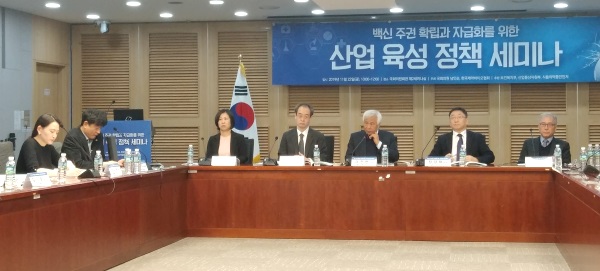“If the domestic vaccine industry becomes advanced enough, we will have vaccine sovereignty and self-sufficiency naturally. The Ministry of Trade, Industry, and Energy will actively ease industrial risks so that many ‘players’ (vaccine suppliers) can make various ‘portfolios’ (products).”
Kim Jae-joon, director of the Bio-Convergence Industry Division of the Trade Ministry, made this and other points at the “Seminar on Industry Promotion Policy for Vaccine Sovereignty and Self-Sufficiency” at the National Assembly on Friday.

The seminar aimed to look for ways to raise Korea’s self-sufficiency of vaccines, which is a global measurement of public health advancement.
The local vaccine market was estimated to be around 570 billion won ($484.5 million) as of 2017, and half of them are imports. The government targets to raise the vaccine self-sufficiency rate to 80 percent by 2022. However, experts said it was almost impossible to achieve the goal and that a rate of 68 percent would be attainable.
“All drugs are important to secure the public’s health rights, and vaccines, in particular, are closer to public goods. This is why the Korean public has a strong awareness of vaccine self-sufficiency,” Kim said. “But our local vaccine supply does not meet the expectations of the public. Thus, our main goal should be nurturing the vaccine industry.”
Vaccines will become self-reliable when more players enter the domestic market to produce more various vaccines, Kim went on to say. The trade and industry ministry will focus on reducing industrial risks than on institutional risks, he added.
Institutional risks refer to a structural problem of the vaccine pricing system and the market’s under-evaluation of locally made vaccines. Industrial risks refer to the businesses’ loss of motive to push for R&D.
While the healthcare industry urges the trade ministry to help them enhance their R&D capacity, the ministry would support those who are closer to commercialization, rather than those conducting primary research, Kim noted. “We will expand our investment so that companies can simplify manufacturing processes, localize raw materials and equipment, and release products quickly,” he added.
To attract vaccine-producing players to the market, the government should provide more incentives or a business model to generate profits or support to help complete a product portfolio, rather than asking them to supply “public goods,” Kim went on to say.
The trade ministry would provide basics to form the market through active support such as encouraging businesses to invest in the current and future product lines, he added.
SK Bioscience CEO Ahn Jae-yong, who attended the Friday seminar, said the trade ministry’s support plan was encouraging.
“I was very impressed by the ministry’s proposal to mitigate industrial risks such as R&D costs and provide incentives for universities, venture firms and investors to concentrate in the business,” he said.
Ahn also expressed frustrations as the operator of a vaccine company such as heavy taxation on licensing-out deals.
In response, the trade ministry’s director Kim said, “If companies notify us a problem, we will actively work with other government agencies to solve the problem.”

